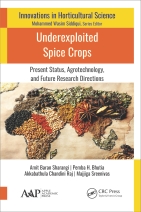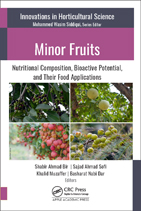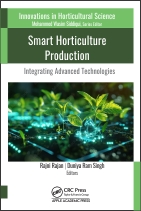|
|
Innovations in Horticultural Science |

 Follow us for the latest from Apple Academic Press:
Follow us for the latest from Apple Academic Press:
New Book Series: AAP Advances in Materials, Manufacturing & Computational Intelligence Techniques plans to offer a comprehensive exploration of cutting-edge research and applications in various engineering and scientific fields. This multidisciplinary series caters to a wide range of readers, from researchers and academics to industry professionals, providing in-depth knowledge and practical insights into solving complex problems. The series explores into a diverse array of topics, including advanced materials, manufacturing techniques, and computational intelligence. For more information, visit:
Click here
AAP WELCOMES PROF. MOHAMMED KUDDUS, PhD, AS AAP’S NEW ACQUISITIONS EDITOR for books on biotechnology, enzymology, microbiology, bioinformatics, bioremediation, biomedical technology, value-added products etc. Dr. Kuddus is Head of the Department of Biochemistry at the College of Medicine, University of Hail, Kingdom of Saudi Arabia. He is listed in Elsevier/Stanford University World’s Top 2% Scientists. He seeks book proposals from potential editors to consider for publication with Apple Academic Press. Contact: kuddus@appleacademicpress.com for more information. AAP welcomes Dr. Maulin P. Shah as AAP’s new acquisitions editor for books on Applied Microbiology, Environmental Biotechnology and Waste Management. Dr. Shah, a Scientist in the Industrial Wastewater Research Lab at Enviro Technology Ltd., India. seeks book proposals to consider for these topics and related areas: applied microbiology, environmental biotechnology and waste management, including environmental pollution, wastewater treatment, bioenergy, biofuel, circular economy, leachate treatment activated sludge process, environmental microbiology, agricultural microbiology, advance oxidation process, bio-electrochemical systems, bacterial genomics for wastewater treatment, and heavy metal remediation. maulinshah1979@gmail.com for more information. AAP is pleased to announce Shrikaant Kulkarni, PhD, as our new Senior Commissioning Editor for books in the areas of Polymer Sciences, Chemical Sciences, Nuclear Sciences, and Material Sciences. Dr. Kulkarni is Adjunct Professor, Faculty of Business, Victorian Institute of Technology, Melbourne, Australia; and Adjunct Professor, Centre of Research Outcome and Impact, Chitkara University, Punjab, India. You can reach him at Email: srkulkarni21@gmail.com for more information. New Book Series: AAP Series on Waste Biomass Valorization will explore the transformation of biomass resources into valuable products, addressing the growing need for sustainable alternatives to fossil fuels and non-renewable resources. For more information and to propose a book, please visit: Click here Congratulations to Hafiz Ansar Rasul Suleria, PhD, for receiving the Dean’s Award for Excellence in Research from the University of Melbourne, Australia, in recognition for his exceptional performance and strong commitment to advanced research in food science. Dr. Suleria is editor of AAP’s book series Innovations in Plant Science for Better Health: From Soil to Fork. For more information, visit: Click here Congratulations to Dr. Christian Mancas. His book Conceptual Data Modeling and Database Design: A Fully Algorithmic Approach was one of the 6 Best Data Modeling ebooks for Beginners by BookAuthority, a leading site for book recommendations. For more information, visit: Click here COMMENTS FROM AAP EDITORS AND AUTHORS AAP book title: Advances in Audiology and Hearing Science (2-volume set) “I have collaborated with AAP during the process of bringing my two-volume editing work to a final publishing phase. AAP support has been truly important throughout the initial and final stages of the book. While the majority of the publishing work is done at the early stages, the final touches that include the last-minute corrections of the authors are extremely crucial to the quality the book tries to convey. The assistance of AAP during the last stages of corrections and communication with the authors was a very positive contributor to my state of mind during those stressful moments. I recommend the publishing experience with AAP to other editors of scientific material.” —Stavros Hatzopoulos, PhD, Hearing Science Laboratory, University Hospital of Ferrara, Ferrara, Italy AAP book title: Nanotechnologies: The Physics of Nanomaterials (2-volume set) “I was very pleased with the interaction and support of the team at Apple Academic Press. They provided me with regular and useful information and updates throughout the publishing procedure. I am also very happy with the final product, which is of good quality. The books are now available and are professionally distributed through the various channels. I would like again to thank the team at AAP for all their hard work and support.” —David Schmool, PhD, Director, Groupe d’Etude de la Matière Condensée GEMaC, National Centre for Scientific Research, Université de Versailles/Saint-Quentin, Université Paris-Saclay,Versailles, France AAP book title: Physiology of Molluscs (2-volume set) “I have enjoyed the full benefit of support, encouragement, and kindness from the members of AAP I have had the pleasure of being associated with. In the same vein, I hope AAP was satisfied with the book series I have edited in advancing the knowledge. It has been a great journey and was a great pleasure and satisfaction. Advancing scholarship through publications is one of the best routes publishers can take, and I would hold AAP as one of the best ones.” —Saber Saleuddin, PhD, University Professor Emeritus, Department of Biology, York University in Toronto, Ontario, Canada AAP book title: Green Chemistry and Sustainable Technology: Biological, Pharmaceutical, and Macromolecular Systems “It had been my pleasure to work with the production team of Apple Academic Press for almost a decade. The best presentation of our work was due to their hard work and with careful scrutiny. I am sure that every one of them takes extra pains to publish the book nicely, maintaining the quality and timeliness. It was a rewarding experience to work with AAP. I would like to publish more with AAP on my upcoming projects in future also.” —Prof. Suresh C. Ameta, Professor of Eminence (Distinguished Professor), Faculty of Science, PAHER University, UDAIPUR, India AAP book title: New Frontiers in Nanochemistry, 3-volume set, plus many others "Publishing a book, either as author or editor, is a journey from the initial vibration to the piece of knowledge towards the present future of humanity at large. Such a journey is about climbing and tunneling, about diving and driving through, about inspiration and tuning, about hard working in every instance; and it is also about time. Very few Global Publishers have the wisdom and patience and kindness and openness to authors, contributors, and readers while being truly crafting oriented as Apple Academic; yet all is about people and their education, vision and assumed mission; the Apple Academic Team heartily succeed that in achieving the world class scholarly acclaim by the quality involvement in all chain of plus value added with each publishing event. Hearty Compliments! Excelsior Apple Academic!" —Mihai V. Putz, PhD, Dr.-Habil., MBA, Professor, Faculty of Chemistry, Biology, Geography, Laboratory of Computational and Structural Physical Chemistry for Nanosciences and QSAR, West University of Timi?oara; PI-1, Laboratory of Renewable Energies - Photovoltaics, National Research and Development Institute for Electrochemistry and Condensed Matter (INCEM), Timi?oara, Romania AAP book title: The Chemical Century: Molecular Manipulation and Its Impact on the 20th Century “All my experiences with AAP have been very positive. I entrusted AAP with the publication of The Chemical Century: Molecular Manipulation and Its Impact on the 20th Century and found the quality of the book that they produced to be excellent. My two contacts at the company were very responsive and efficient throughout the publication process.” —Richard J. Sundberg, PhD, Professor of Chemistry, University of Virginia, Charlottesville, Virginia, USA AAP book titles: Medical Tourism and Wellness: Hospitality Bridging Healthcare (H2H)© and Medical Travel Brand Management: Success Strategies for Hospitality Bridging Healthcare (H2H) “I have enjoyed my scholarly creative work with Apple Academic Press. They have been timely, creative, and very helpful for my two books with them. I encourage you to consider publishing your work with AAP.” —Frederick DeMicco, PhD, RDN, Executive Director and Professor School of Hotel and Restaurant Management, Northern Arizona University, Flagstaff, Arizona AAP book title: The Chemical Evolution of Phosphorus: An Interdisciplinary Approach to Astrobiology “I’m very pleased with the books you have edited. It shows a very good and careful work by everyone involved along the whole production process, and so the final result is a beautiful piece: it has come out as a very nice and appealing book, easy to handle and read, .... and hopefully of interest for people from diverse related fields!” —Enrique Macia-Barber, PhD, Professor of Condensed Matter Physics, Universidad Complutense de Madrid, Spain |
Copyright © 2025 Apple Academic Press Inc. All Rights Reserved.





















